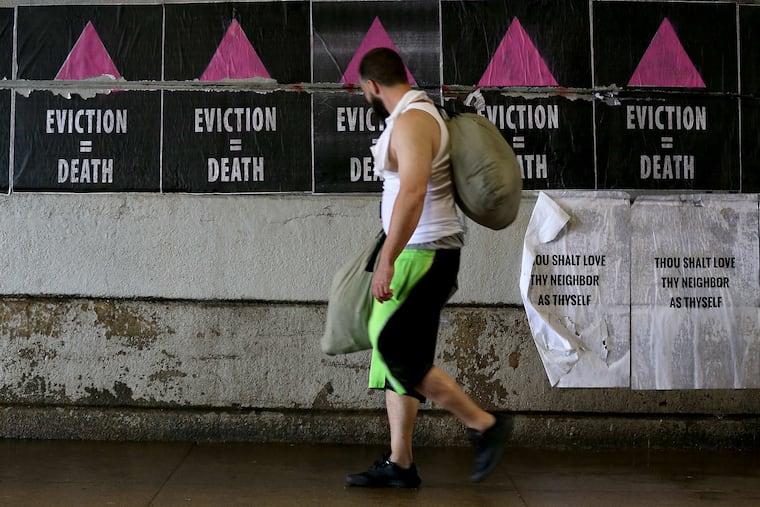As eviction crisis looms, Philly courts must take swift action beyond two-week delay | Editorial
The endless loop of eviction moratoriums and expirations is a piecemeal approach to a serious problem with severe impacts on families and communities.

On Wednesday, Philadelphia Municipal Court President Judge Patrick Dugan gave renters who were about to be evicted out of their homes a two-week delay. His order, like the one issued by the Centers for Disease Control and Prevention last week, hours after Gov. Tom Wolf’s moratorium expired, is good news. But the endless loop of moratoriums and expirations is a piecemeal approach to a serious problem with the potential to undermine all the progress Philadelphia achieved in reducing COVID-19 infection.
The court order instructs the landlord tenant officer, the court-appointed officer who delivers final notice and execute evictions, to delay any lockouts until Sept. 23. It also limits the number of final notices that can be served on those two weeks. With the final notice, tenants will receive information on the CDC order that requires them to complete a formal declaration in order to have the eviction process halted.
According to a University of Pennsylvania epidemiological simulation, every 70 evicted households would correspond with at least one extra COVID-19 death. By delaying all lockouts, Judge Dugan contributed to the efforts to suppress the pandemic’s hold on the city.
But what happens when that two-week delay expires? The court should take some critical steps to reduce uncertainty and ensure that tenants aren’t falling between the cracks.
The more than 300 households that received final notice already before the court closed in March, and hence can be locked out starting on the 23rd, might not be aware of the new timeline. The last communication they received from the court was months ago about an earlier moratorium. The court should make concentrated outreach to these tenants — and keep in mind that mail is currently experiencing significant delays and does not ensure receipt.
» READ MORE: Evicted without warning: How Philly’s troubled system leaves some tenants blindsided and locked out of their homes.
Including information on the CDC moratorium with the final notice is good, as long as it gets to tenants. In July, this board exposed concerns that tenants don’t receive the crucial final notice. The delivery of the notice is the only step of the process that is not memorialized in the public docket. The court claims that receipts of service exist, so uploading them should be an easy step to increase transparency. (On Thursday, Councilmember Helen Gym introduced a resolution calling on City Council to hold a hearing on this matter.)
The court should also translate all materials about the CDC eviction moratorium to multiple languages. Currently, the only declaration that is available on the court’s website is in English.
Finally, the court should take an active role in promoting Philadelphia’s Eviction Diversion Program that can resolve landlord-tenant disputes outside the court. City law requires that landlords attempt mediation through the program before filing an eviction. To ensure compliance, the court could require landlords to sign an affidavit that they attempted diversion before filing.
» READ MORE: CDC’s eviction moratorium is critical relief, but it doesn’t let states off the hook | Editorial
Rent relief, not technicalities, will actually prevent the eviction avalanche that is heading our way — and making sure that relief gets to all those who need it is the responsibility of state lawmakers. Keeping communities stable during a pandemic benefits tenants, landlords, and Philadelphia as a whole — and Municipal Court should be an active partner in this effort.